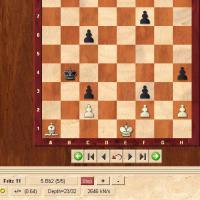
Why 5.h3? Prize for the best answer
Sat 3/31 - final comments, scroll down below.
==============================================================================
Hi,
Recently, I came across the following position. I think White has to play 5.h3 here.
|
Someone who posts (or submits) first an accurate and concise explanation why 5.h3 (or a different move) must be played here, can claim a prize - free book Chess Exam You vs. Fischer (you pay for s/h) |
 |
Please be brief - no detailed variations, and no inserting diagrams with moves. Write a short paragraph with explanation. You can add your answer here, or contact me on my website - here

Questions or comments or to be notified about future updates - please contact me here
Thank you,
Igor Khmelnitsky
International Chess Master,
Experienced Coach,
Award-winning Author
Wow
Added 24hrs after the original post:
Wow, I am glad to see that many people enjoyed this position. 74 posts! I like several of the answers, but... there is still room for you to give it a try. I will award an additional prize to the reader's favorite. Please refer to 1-2 posts you think deserve to win. Whose comment was the most concise and gave you a good idea to follow? Note - I am not asking about how to reach the best result! Only asking - which move to play in this position.
I plan to end contest on Saturday.
Sat 3/31 -
Humans are not computers and make mistakes in calculations. Especially, lower rated players. So, whenever possible, I recommend (and do this in my games) relying less on calculation and more on basic reasoning. To save time, energy and make less mistakes. It isn't likely that one can play the entire game without calculating, but it is certain that many moves can be played without it. General principles can and should guide you in static positions. Moreover, even in dynamic positions, you can rely somewhat on general principles, but heavily on the process of elimination.
So, I would praise any of my students if they would spent less then a minute on this position, play 1.h3 and say something like –
“I saw nothing better at the moment, while it somehow may help - stopped the Black h-P where it can be taken by the B and gave extra space for my K to maneuver”
Whether or not White wins (he does!) and how the game would continue may become apparent later, but shouldn’t be White’s concern at the moment. I believe, that even some of the people who posted and gave incorrect answers, could have actually succeffully won this game, if they played 1.h3. Some would just keep moving the K around and win by accident! This couldn't happen without 1.h3.
None of the posters mentioned process of elimination (or "simple" nothing looked better!)
The closest was answer by chessisgood: The idea behind h3 is simple. First, this keeps black's h-pawn on a square the bishop can attack. However, it also gives a space for the white king to triangulate, from which it can proceed to a2 and force the king out. Once the bishop captures the c-pawn, the h-pawn will fall as well.
Also, I like short comments from users zezpwn44 and oldpal.
As far as more comprehensive and detailed answers explaning the whole idea, which I wasn't asked but many found enjoyable - Phen, Sheardp, and leonardousta (who came late, but mentioned Ph4 on dark square).
All 6 people are welcomed to contact me via Chess.com or my site - here to claim the prize:
Chess Exam You vs. Fischer(you pay for s/h)>
To chessisgood, you get a little extra - I will wave the cost of shipping/handling (to US address). Thanks for all who participated.
Have you taken my Chess Exams? Check Amazon.com or my website for special offers. Let me know what you think - here
Igor
